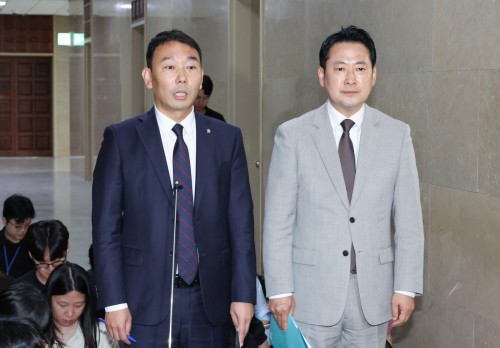 |
| Rep. Kim Yong-min of the Democratic Party (left) and Rep. Jang Dong-hyuk of the ruling People Power Party speak to reporters at the National Assembly in Yeouido, Seoul, on July 2 after agreeing to pass the revised Commercial Act. / Source: Yonhap News |
South Korea’s ruling and opposition parties agreed on July 2 to pass a revised Commercial Act that includes a modified version of the controversial “3% rule.” The bill is expected to become the first piece of legislation passed with bipartisan agreement since the launch of the Lee Jae-myung administration.
Kim Yong-min of the Democratic Party and Jang Dong-hyuk of the People Power Party, both ranking members of the National Assembly’s Legislation and Judiciary Committee, held a briefing after their meeting at the National Assembly in Yeouido, Seoul. Kim explained, “We included the three items agreed on earlier in the morning, and both parties also agreed to apply the 3% rule to the separate election of outside directors who serve as audit committee members.”
The “3% rule” limits the voting rights of a company’s largest shareholder to 3% when electing audit committee members. The aim is to protect minority shareholders and enhance the independence of audit boards by curbing the influence of major shareholders. However, the rule has long faced pushback from the opposition and business community, who see it as a threat to corporate management stability.
Earlier in the day, the two parties had already reached consensus on three key points in the Judiciary Committee’s subcommittee: introducing fiduciary duties for directors to protect shareholders, allowing electronic shareholder meetings, and modifying the definition of independent directors.
Though the two parties initially disagreed on the 3% rule and cumulative voting during the morning session, a subsequent leadership-level meeting in the afternoon led to a breakthrough.
However, some issues remain unresolved. The parties agreed to continue discussions on cumulative voting and expanding the number of outside directors on audit committees—from the current one to either two or all members—through a public hearing process.
“The commercial law revision will have a major impact on the Korean stock market,” said Rep. Jang. “A bipartisan agreement will send a much more positive message to the market than a partisan push.”
Rep. Kim added, “The National Assembly is doing its best to fulfill the Lee Jae-myung administration’s pledges of national unity and economic revitalization. This commercial law revision, agreed upon by both parties, is the first such example.”
Following the leadership agreement, the revised Commercial Act including the 3% rule passed the subcommittee and is expected to be approved at the National Assembly plenary session as early as July 3.
Most Read
-
1
-
2
-
3
-
4
-
5
-
6
-
7





















